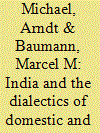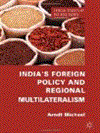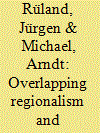| Srl | Item |
| 1 |
ID:
134956


|
|
|
|
|
| Summary/Abstract |
In her position as a rising power, India has reassessed and reinvigorated the entirety of her relations with Africa in the past decade. These relations cover the economic, political and the security spheres. They are the result of India’s ideational foreign policy change, her economic growth trajectory, looming energy insecurity and India’s role as an increasingly important international stakeholder. The main argument of the article is that India has successfully worked out her own policies, institutional structures and inter-regional development schemes with unique characteristics to develop and deepen linkages with sub-Saharan Africa. The article concludes that India now has a potential of assuming the role of ‘game changer’ in the new scramble for Africa’s resources and the struggle for votes and support of African states in international institutions and fora.
|
|
|
|
|
|
|
|
|
|
|
|
|
|
|
|
| 2 |
ID:
160692


|
|
|
|
|
| Summary/Abstract |
Successful multilateral economic, political or security cooperation as best exemplified by organizations such as the EU or ASEAN invites the question why comparable organizations have never been established in South Asia and the Indian Ocean Rim, two geo-strategically important world regions. This article foregoes political-realist arguments and offers an alternative explanation for the failure of regional multilateralism in those two regions by using the social-constructivist framework of norm localization. This framework, based upon third-generation norm diffusion, provides a new analytical toolbox for analysing the general puzzle why one region may accept a particular norm while rejecting another. Arguing the case for the existence of a special South Asian regional variation of multilateralism which is termed ‘Panchsheel-multilateralism’, the article examines the process of the localization of the global norm regional multilateralism and analyses how this norm became institutionalized in the form of the South Asian Association for Regional Cooperation (SAARC) and the Indian Ocean Rim Association (IORA). The main argument of the article is that the global norm of regional multilateralism has been localized into a principally Indian influenced model of multilateralism, based on the latter’s cognitive prior. Consequently, there has virtually never been room for any genuine multilateral cooperation, while tangible cooperative results are found in the bilateral domain only.
|
|
|
|
|
|
|
|
|
|
|
|
|
|
|
|
| 3 |
ID:
143937


|
|
|
|
|
| Summary/Abstract |
International land “acquisition” or land “grabbing” has become a global phenomenon in which India plays an increasingly important role. While there is a critical domestic debate regarding land deals within India — especially pertaining to the provisions of the Land Acquisition Act of 2014 — there is practically no such debate regarding international land deals by Indian companies in Sub-Saharan Africa. By applying a two-level discourse analysis, this article argues that the land discourse within India can be understood as a strategy of exclusion. By linking land issues with questions of “development,” the discursive strategies of powerful actors lead to the exclusion of the arguments of NGOs and others opposed to the land deals from the discourse within India. This strategy of exclusion is then taken to the extreme with the strategy of securitization outside India: land deals are linked to “food security,” as the example of Ethiopia highlights.
|
|
|
|
|
|
|
|
|
|
|
|
|
|
|
|
| 4 |
ID:
129807


|
|
|
|
|
| Edition |
1st ed.
|
| Publication |
Hampshire, Palgrave Macmillan, 2013.
|
| Description |
xiv, 225p.
|
| Standard Number |
9781137263117
|
|
|
|
|
|
|
|
|
|
|
|
Copies: C:1/I:0,R:0,Q:0
Circulation
| Accession# | Call# | Current Location | Status | Policy | Location |
| 057721 | 327.54/MIC 057721 | Main | On Shelf | General | |
|
|
|
|
| 5 |
ID:
167594


|
|
|
|
|
| Summary/Abstract |
This article examines the phenomenon of overlapping regionalism in South and Southeast Asia. Theoretically it rests on Thomas Pedersen’s ‘ideational-institutionalist realism’ approach. We argue that in the two sub-regions under study the proliferation of regional organizations has been greatly stimulated by hegemonic and counter-hegemonic dynamics involving Asia’s largest powers, China and India. We claim that sceptical world views highlighting vulnerability, victimization and national survival are deeply entrenched in the mental maps of the regions’ foreign policy elites. Regional institution building is thus informed by the tenets of realism. We trace how and why China and India seek to establish ‘cooperative hegemonies’ by building regional institutions for incorporating their neighbours into their sphere of influence while keeping rival powers at bay, and also show why smaller states in the region join these regional fora.
|
|
|
|
|
|
|
|
|
|
|
|
|
|
|
|